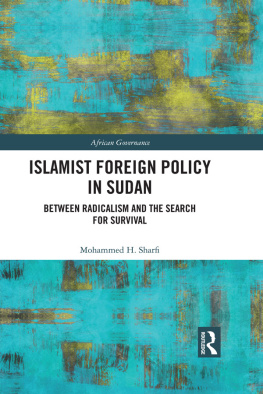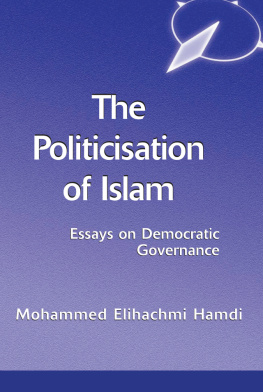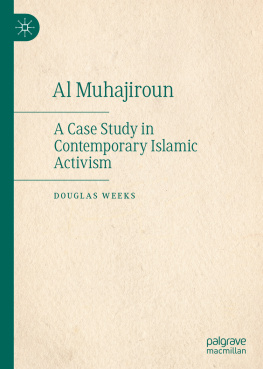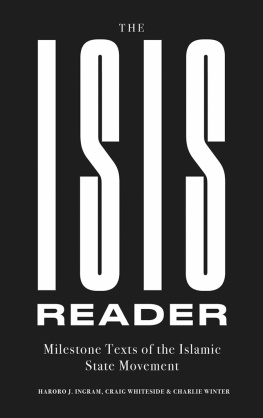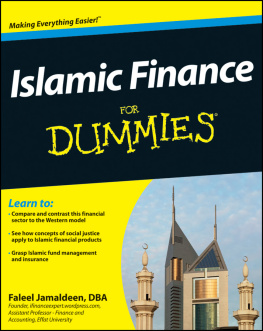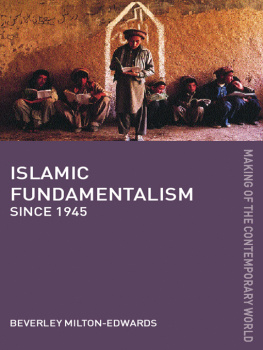THE ISLAMIC MOVEMENT IN EGYPT
A PUBLICATION OF THE GRADUATE INSTITUTE OF INTERNATIONAL STUDIES, GENEVA
Also published in this series:
The United States and the Politicization of the World Bank
Bartram S. Brown
Trade Negotiations in the OECD
David J. Blair
World Financial Markets after 1992
Hans Genberg and Alexander K. Swoboda
Succession Between International Organizations
Patrick R. Myers
Ten Years of Turbulence: The Chinese Cultural Revolution
Barbara Barnouin and Wu Changgen
The International Organization of Hunger
Peter Uvin
Namibia and Southern Africa: Regional Dynamics of Decolonization
194590
Ronald Dreyer
THE ISLAMIC MOVEMENT IN EGYPT
Perceptions of International Relations 196781
Walid Mahmoud Abdelnasser
First published in 1994 by
Kegan Paul International
This edition first published in 2011 by
Routledge
2 Park Square, Milton Park, Abingdon, Oxon, OX14 4RN
Simultaneously published in the USA and Canada
by Routledge
711 Third Avenue, New York, NY 10017
Routledge is an imprint of the Taylor & Francis Group, an informa business
The Graduate Institute of International Studies 1994
All rights reserved. No part of this book may be reprinted or reproduced or utilised in any form or by any electronic, mechanical, or other means, now known or hereafter invented, including photocopying and recording, or in any information storage or retrieval system, without permission in writing from the publishers.
British Library Cataloguing in Publication Data
A catalogue record for this book is available from the British Library
ISBN 10: 0-7103-0469-2 (hbk)
ISBN 13: 978-0-7103-0469-8 (hbk)
Publishers Note
The publisher has gone to great lengths to ensure the quality of this reprint but points out that some imperfections in the original copies may be apparent. The publisher has made every effort to contact original copyright holders and would welcome correspondence from those they have been unable to trace.
To my Mother, who taught me that ones success depends on ones commitment, will, hard work and perseverance; to all that she has done for me;
To my Father, who taught me that ones value is derived from ones involvement with the surrounding milieu;
To my Brother, in whose library I read for the first time in my life terms that later largely shaped my intellectual orientations;
To my dear Lebanese friend Yasir Sabra, from whom I once learned what true friendship means.
CONTENTS
ACKNOWLEDGEMENTS
This work is the fruit of extensive research and persistent hard work to which I devoted my efforts in the period between 1987 and 1991, in order to fulfil requirements for obtaining the PhD degree from the University of Geneva (the Graduate Institute of International Studies).
I wish to take this opportunity to express my due gratitude towards my thesis supervisors, Professor Harish Kapur, Professor Mohammed Reza Djalili and Professor Georges Abi Saab. Their great sense of commitment and involvement were indispensable in developing my work. Their reading and re-reading of my initial drafts along with their patient encouragement are going to be an unforgettable memory for me.
I cannot fail to express my sincere gratitude to Professor P. J. Vatikiotis for kindly accepting to be the external examiner of my thesis and for his special interest in the subject.
Special thanks are due to those whom I interviewed in the context of undertaking research necessary for the thesis, particularly Mr Adil Husain, Dr Ahmad Kamal Abdul-Majd, Mr Fahmy Huaidy, and Dr Rifat Sayyid Ahmad. I also thank Dr Ahmad Khalifa, Dr Ali E. Hilal Dessouki, Dr Sad al-Din Ibrahim, Dr Walid Kazziha, Dr Salwa Sharawy Juma and Dr Mustafa Kamil al-Sayyid for their support and the illuminating comments they made on the subject of my thesis, and for the constructive suggestions they put forward concerning the methodology of my work which were instrumental in guiding this study and improving its content.
The completion of this work would not have been possible without the sources that I looked for in various Egyptian bookshops and libraries, particularly the library of the American University in Cairo, as well as the United Nations Library in Geneva and the Library of the Graduate Institute of International Studies in Geneva. I do appreciate the helpful efforts of those working in those libraries. In this respect, I also feel obliged to express my gratitude to those who provided me with additional and useful sources, particularly my Father, Mr Muhammad al-Sayyid (al-Yamany), Dr Ala al-Hadidy, Mr Amjad Abdil-Ghafar, Dr Manal Fuad, Mr Bahir Hilmy, Dr Ibrahim Salama, Mr Khalid Khairy and Mr Umar al-Turaby. A substantial number of primary sources cited in the bibliography of this work were published in a two-volume compilation and commentary by Dr Rifat Sayyid Ahmad on the Islamic movement in Egypt, published by Riad El-Rayyis in London in 1991 under the title of The Armed Prophet.
I cannot forget the continuous support and encouragement that my parents provided for me.
I am thankful for Ms Caroline Bilkey and Ms Jean Hudson for their help in the language editing of the original thesis in its final draft.
I also wish to acknowledge the understanding and encouragement I received from Ambassador Dr Nabil Elaraby, Permanent Representative of Egypt to the UN. A similar acknowledgement should go to Mr Moustapha Omar, former Minister Plenipotentiary of the Permanent Mission of Egypt to the UN in Geneva.
I am grateful for Mrs Alaoui who typed this work beginning with its first draft and who bore my pressing short deadlines.
Finally, I should like to mention that throughout this work, I used the Chicago University system of transliteration as shown in the International Journal of Middle Eastern Studies (IJMES) for names of persons, parties, organizations and provincial towns.
INTRODUCTION
This book does not intend to address itself to Egyptian foreign policy in any specific period or to the influence of Islam on Egyptian foreign policy. Its focus is rather on the global vision of the various components of the Islamic movement in Egypt from 1967 to 1981. It is, in fact, a case study of the perception of foreign policy issues and the international system by the Islamic movement. Whilst acknowledging that the subject matter has religious origins, this thesis considers Islam in a politico-ideological context.
One has to bear in mind that the subject matter, i.e. the contemporary Islamic movement in Egypt, has always acted as a political force in opposition. The significance of studying a political movement and its views on world affairs lies in the rise of the influence of non-governmental groups that transcend national borders, which include religious groups.
The West started to analyze the role religion played in mobilizing Third World peoples in their struggles to defend their traditions against the physical might of Western colonialism. The West was keen to understand the revolutionary role of clergymen in Latin America, of Buddhist monks in Vietnam and of Islam in the liberation movements of North Africa, particularly Algeria.the Muslim World. There are intellectual and political reasons for that interest. It was due to,




